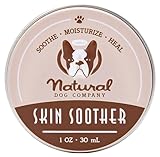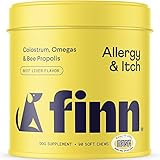“This post contains affiliate links, and I will be compensated if you make a purchase after clicking on my links.”

Seasonal allergies in dogs can get under our furry friends’ skin, literally and figuratively, like they do with us hoomans.
Dogs can be allergic to many things they encounter in the environment, but pollen is usually one of their top enemies – not only during spring time, but also during the summer season.
While many people associate allergies to spring season, summer can also bring about high pollen counts. And that usually means red, irritated, and itchy skin for our furry friends.
Learn how to ditch the itch for your dog this summer and learn everything you need to know about summer seasonal allergies here.
What Are Summer Seasonal Allergies In Dogs?
Summer seasonal allergies in dogs, as the term suggests, are allergies that occur during the summer season. It’s when a dog’s allergies flare up significantly due to specific allergens in the summer.
Seasonal allergies in dogs are also called atopic dermatitis or canine hay fever. They are referred to as such, because unlike a hooman with seasonal allergies who usually have runny eyes and nose, a scratchy throat, a dog usually have red, itchy and irritated skin.
And seasonal allergies are different from year-round allergies in the sense that dogs do not have allergic reactions all year long, only specific times of the year.
Furthermore, these summer seasonal allergies in dogs are also more common during late summer. And they can vary from mild to severe, and should be managed and treated accordingly.
Common Summer Allergens For Dogs
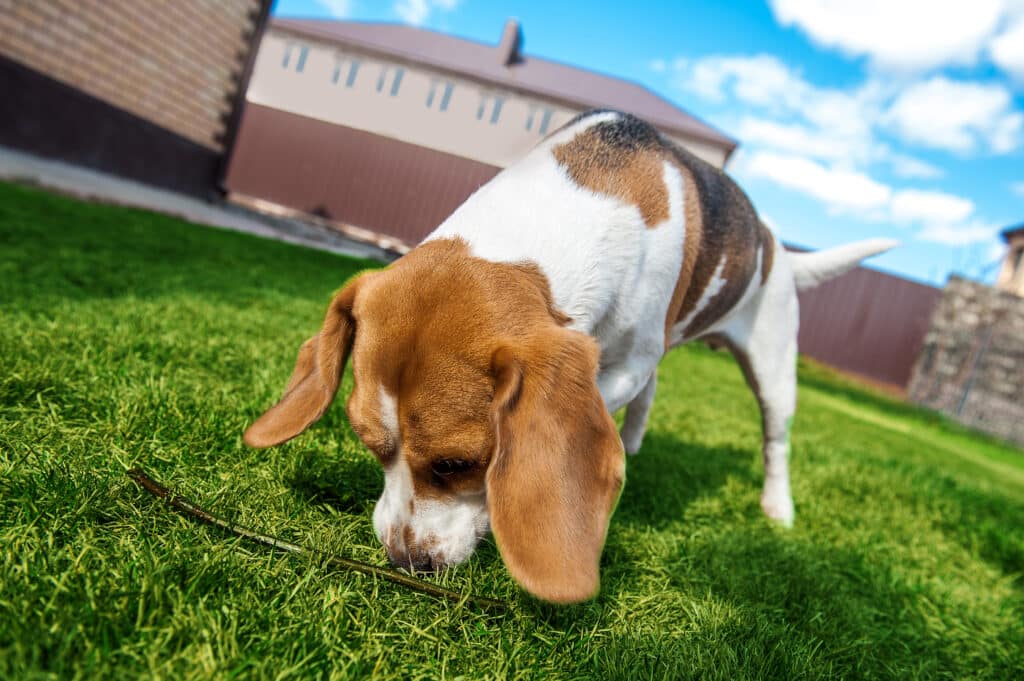
As mentioned above, there are specific environmental allergens in the summer that trigger and cause a dog’s allergies, and they are the following:
1. Tree, Weed And Grass Pollen
While many trees have already released their pollen in the spring, there are still trees that release pollen in the summer time. Furthermore, a lot of weed and grass also release this substance in the summer. And they largely contribute to a dog’s summer allergies because they are low on the ground and are closer to where our pooches walk, lay and play.
The following tree, weed and grass types may affect your dog that is allergic to pollen:
- Cedar
- Ash
- Oak
- Cockleweed
- Pigweed
- Sagebrush
- Ragweed
- Timothy
- Bermuda
- Blue grasses
- Orchard
- Red Top
- Sweet vernal
2. Mold Spores And Mildew
The warm and humid conditions that the summer season bring about promote the growth of mold and mildew inside the house. And the spores released when these fungi grow trigger allergies in dogs, especially if your pooch has sensitive skin.
3. Dust Mites
Dust mites are microscopic insects that are commonly found in beds (including your dog’s bed), carpets and other upholstery. While they are present all year long, their presence is more prominent in the summer season because they love the humidity.
And so, these dust mites and the waste they produce causes itchy, red and irritated skin in dogs.
4. Insect Bites
Summer seasonal allergies in dogs can also be triggered by insect bites. Stinging insects in the summer such as bees, wasps, yellow jackets, and hornets have the most aggressive activity from August to October.
And dogs, like hoomans, can have a severe allergic reaction to a sting. So, it’s always best to monitor your dog’s outdoor activity in the summer, especially when these insects are more prevalent.
5. Smog
Another culprit that triggers summer seasonal allergies in dogs is smog, especially if you live with your dog in the city.
The combination of the summer breeze, pollution from car exhaust, and other chemicals can trigger a dog’s allergies.
Symptoms Of Summer Seasonal Allergies in Dogs

Symptoms of summer seasonal allergies in dogs vary, depending on what they are allergic to. But the most common symptoms include:
- Red, itchy and irritated skin
- Dry or scaly skin
- Watery and itchy eyes
- Excessive licking of their paws
- Biting their skin or coat
- Red, waxy, smelly and/or inflamed ears
- Hair loss or excessive shedding
- Nasal discharge
- Sneezing
Oftentimes, when dog owners are unaware of their dog’s allergies, they do no recognize these symptoms as actual allergic reactions and mistake them for other health issues.
If you suspect your dog to have seasonal allergies, it’s essential that you bring them to the veterinarian as soon as possible. The vet will ask you various questions and thoroughly check your dog’s condition to properly address the problem.
Managing And Treating Summer Seasonal Allergies in Dogs
In general, since seasonal allergies are caused by environmental factors, there is no permanent cure to them. But you can help your dog alleviate the symptoms in various ways.
Furthermore, managing and treating summer seasonal allergies in dogs depend on the symptoms and how severe it is.
Below, we have listed down a few helpful ways to manage and treat summer seasonal allergies in dogs. You can try one or try a combination – whatever works best for your furry friend!
1. Consult A Veterinarian And Identify the Allergen
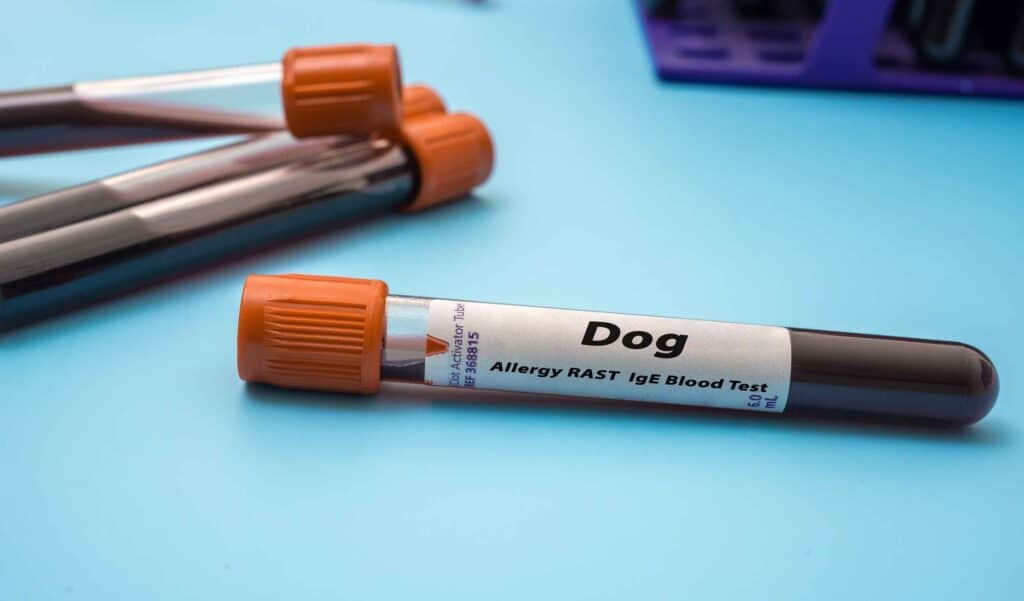
If you suspect that your dog is showing symptoms of summer seasonal allergies, it’s always best to bring them to their vet immediately. This way, the vet can accurately diagnose your dog’s allergies. And from there, you can devise the most effective treatment plan for your pooch.
Furthermore, they can suggest and conduct allergy testing to help you identify what specific allergens trigger your dog’s allergies.
2. Reduce Allergen Exposure

Avoiding allergens altogether may be impossible to do, since allergens can be airborne. However, you can still reduce your dog’s exposure to allergens through various ways, like:
- Keep your dogs indoors when pollen count is high, which is typically in the early morning or late evening.
- Supervise your dog’s outdoor activities. This is to make sure they do not encounter any stinging insects.
- Use air purifiers, filters or dehumidifiers at home to reduce the humidity in the air, and therefore, airborne allergens.
- Clean and vacuum your house regularly, especially carpets and upholstery, to reduce dust mites.
- Wash your dog’s bed frequently. Again, this is to help remove dust mites or other possible allergens.
- Avoid areas with high levels of pollen, such as parks with a lot of trees and plants.
3. Regular Bathing

While bathing a dog should be ideally done once or twice a month, this will not work if your pooch suffers from seasonal allergies.
Regular bathing and grooming is a must for dogs with allergies because it can help remove allergens from their skin and coat. And usually this is most effective when you use hypoallergenic shampoo.
Here are our top hypoallergenic shampoo picks:
4. Topical Therapy
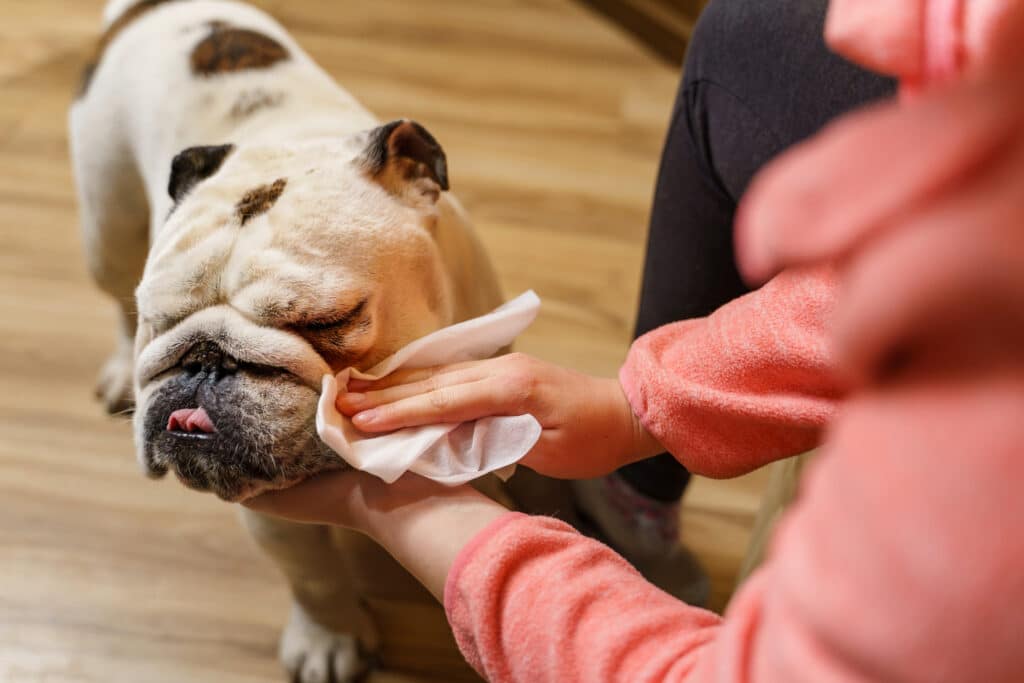
Topical skin therapy is helpful in instantly relieving your pooch from itch, can reduce inflammation, and soothe your dog’s skin. And it comes in a variety of options – balms, shampoos, conditioners, wipes, ointment, wipes and sprays.
Furthermore, you may want to try using one of the most popular all-natural treatment for seasonal allergies in dogs which is Cannabidiol, or more commonly known as CBD.
Here are a few topical therapy options you can try from Amazon:
5. Supplements

Supplements that help with seasonal allergies in dogs are omega-3 fatty acid supplements. Omega-3 fatty acids help alleviate allergy symptoms and also protect your pooch’s skin barrier.
However, it takes about four to six weeks for these supplements to take effect, so it’s best for dogs with seasonal allergies to be on these supplements all year long.
And aside from alleviating allergy symptoms, omega-3 fatty acids are good for the dog’s immune system, heart and kidney. It can even help reduce anxiety in dogs!
Here are a few options you might want to try:
6. Medication

If other treatment options are not working, then your dog’s veterinarian may suggest medications like anti-histamine, corticosteroids or other allergy medications. The type of medication will depend on the severity of your dog’s seasonal allergies.
However, please be reminded that these medication should ONLY be prescribed and possibly administered by the vet. This is to make sure that your dog will get the right dosage and minimize and adverse side effects.
7. Immunotherapy
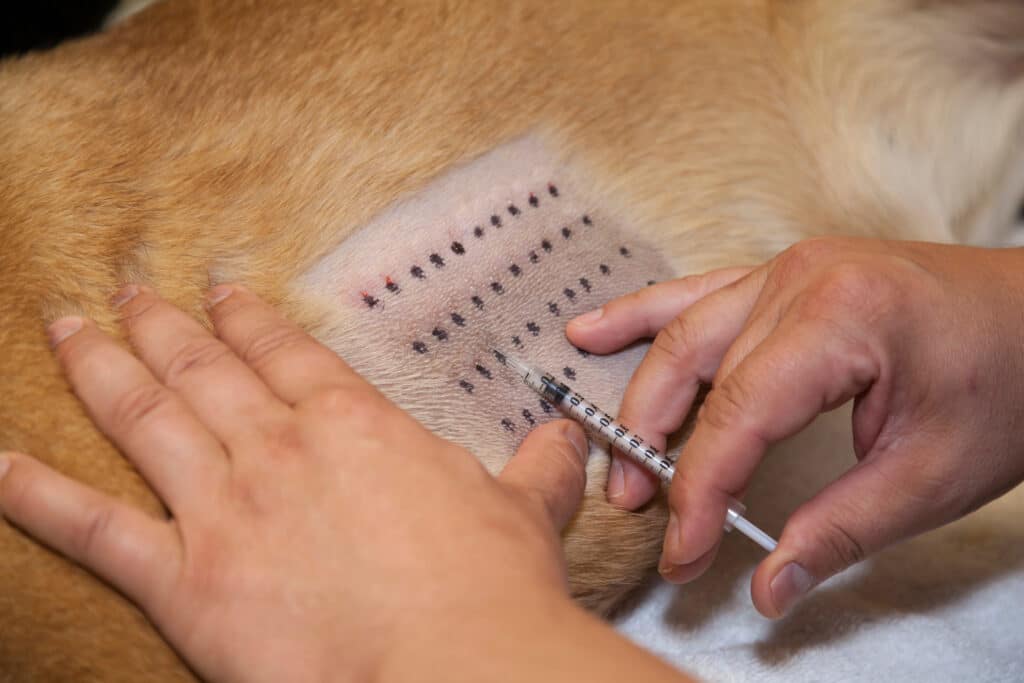
If your dog’s allergies have become severe, allergy shots or immunotheraphy might be your best option. As a matter of fact, this is one of the best long-term management for seasonal allergies in dogs. What it does is it gradually desensitizes your dog’s immune system to its allergens.
With immunotheraphy, they first conduct an allergy test on your dog to determine what allergens trigger their symptoms. And then the vet will create a custom allergy shot based on your dog’s allergens.
Furthermore, allergy shots are not a one-time thing. Your dog’s vet will determine how long the immunotherapy will last and dogs won’t see the improvement for at least six months to one year. So, it requires commitment and a lot of patience, too.
Conclusion
No dog parent likes seeing their pooch suffer in any way, shape or form, especially this summer season, when it’s already hot and they are prone to other problems like heat stroke.
While there is no permanent cure to summer seasonal allergies in dogs, or for any seasonal allergies for that matter, you can still help your dog alleviate its allergies through various methods.
The sooner you address the problem, the better chances of controlling the symptoms and relieving your dog from the discomfort and pain the allergies bring about.







